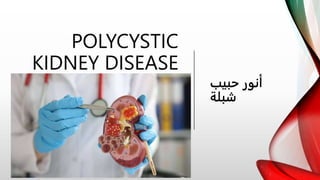
Polycystic Kidney Disease.pptx
- 2. TITLE LOREM IPSUM DOLOR • Polycystic kidney disease (PKD) is a genetic disorder characterized by the growth of numerous fluid-filled cysts in the kidneys, which destroy the nephrons. • PKD cysts can profoundly enlarge the kidneys while replacing much of the normal structure, resulting in reduced kidney function and leading to kidney failure.
- 3. • PKD can also cause cysts in the liver and problems in other areas, such as blood vessels in the brain and heart • The number of cysts and the resulting complications help distinguish PKD from the usually harmless cysts that can form in the kidneys in later years of life • In the United States, PKD and cystic diseases are a leading cause of kidney failure
- 4. Two major inherited forms of PKD exist: • Autosomal dominant PKD is the most common inherited form. Symptoms usually develop between 30 and 40 years of age, but they can begin earlier, even in childhood. About 90% of all PKD cases are autosomal dominant PKD Autosomal recessive PKD is a rare inherited form. Symptoms of autosomal recessive PKD begin in the earliest months of life or in utero.
- 5. When autosomal dominant PKD causes kidneys to fail, which usually happens after many years, the patient requires dialysis or kidney transplantation. Approximately one half of individuals with autosomal dominant PKD progress to stage 5 CKD, requiring renal replacement therapy.
- 6. CLINICAL MANIFESTATIONS Signs and symptoms of PKD result from loss of renal function and the increasing size of the kidneys as the cysts grow. Kidney damage can result in hematuria, polyuria (excessive urine production), hypertension, development of renal calculi and associated UTIs, and proteinuria The growing cysts are noted with reports of abdominal fullness and flank pain (back and lower sides).
- 7. ASSESSMENT AND DIAGNOSTIC FINDINGS PKD is a genetic disease; therefore, careful evaluation of family history is necessary. Palpation of the abdomen will often reveal enlarged cystic kidneys. Ultrasound imaging of the kidneys is the preferred technique for diagnosis
- 9. MEDICAL MANAGEMENT PKD has no cure treatment is largely supportive and includes blood pressure control, pain control, and antibiotic agents to resolve infections Once the kidneys fail, renal replacement therapy is indicated Genetic linkage studies and counseling may be indicated, particularly when screening family members for potential kidney donation